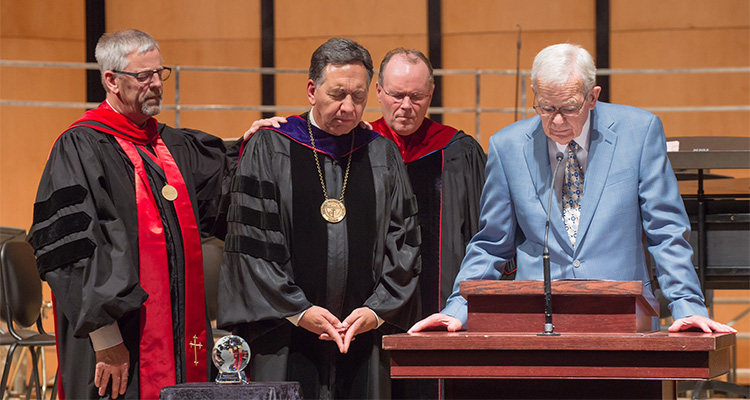NNU inaugurates 13th president

A ceremony rich in higher-education traditions marked the inauguration of Northwest Nazarene University’s 13th president, Joel K. Pearsall, October 6.
In the 103-year history of NNU, this inauguration marks the first time a father and son have been president of the institution. Kenneth H. Pearsall was NNU’s eighth president and served from 1973 to 1983. During his service, Kenneth saw growth in the college with peak enrollments of more than 1,300 undergraduate and master’s students for three of the baby-boom years.
During the later years of Kenneth Pearsall’s presidency, the youngest of his four children, Joel, enrolled. Like his father, Joel began a career that would span a life of service to God in the church and the university to which he returned and served in many roles — including Board of Trustee member, vice president for Financial Affairs, legal counsel, vice president of University Advancement, and now its 13th president.
Current NNU professor Dennis Waller, a classmate of Joel’s and also a student while Kenneth was president, reflected on the Pearsalls.
“Nearly 40 years of memories are involved in thinking about Dr. Ken Pearsall, who was the first NNU president I served under, and now Joel, the sixth president," he said. "Trying to compare the father and son is an interesting exercise, yet, I suggest there are common traits wrapped up in their leadership qualities — first of which are honesty and truth; second, communication and trust; and finally, humility and kindness. I am proud to have served with both men as president, and ultimately I can say both of them are examples of servant leaders.”
For the evening’s program, Joel invited representatives of key constituent groups to speak on the four core values on which the university was founded — transformation, truth, community, and service.
Amanda Marble, staff policy council chair, reflected on the relevance of service (the third value), how it relates to NNU and her mission, and how it has been at the core of who NNU is and continues to be.
“Values call people to action,” she said. “In Martin Luther King Jr.’s book Where Do We Go From Here: Chaos or Community?, he wrote, ‘Education without social action is a one-sided value because it has no true power potential.’ Said another way, ‘Education without service is a one-sided value; education without action limits one’s ability to make a lasting contribution to the world.’”
Marble noted this is why NNU not only values truth, transformation, and community, but also service, because without service, education is only good for the individual.
“In November 1916 the first Campus Serve Day was held, not for the purpose of sprucing up the campus, but for the purpose of helping students and employees stay warm since as the university had run out of coal," she said. "An event born out of necessity became an annual tradition that brought the entire campus community together for a day of service.”
One hundred years later, the value of service continues to be distinctive of the NNU community.
Joel began his address by taking the audience back NNU's beginning in 1913, noting at the time the price of a gallon of milk was 36 cents, the 16th and 17th Amendments were ratified, Ford Motor Company introduced the first moving assembly line that reduced production time of the Model T from 12 hours and 8 minutes to 1 hour and 33 minutes. Pearsall explained that 1913 was also the year when seven men signed on as the initial directors of the Idaho Holiness School, now known as Northwest Nazarene University.
Pearsall said he has been asked whether the 103-year-old entity, planted in sagebrush in Nampa, Idaho, can be relevant today and proposed that NNU is indeed relevant in the 21st century and is desperately needed in the world today.
“NNU has not been static these 103 years," he said. "If it had, it would not be in existence today. Rather, NNU has adapted its programs and methodology as societal demands and needs have changed. But it is not only the ability to adapt that allows NNU to be relevant. It is also those important things that have not changed — the belief that the intellect and the spirit should not be seen as separate but as parts of the whole, divinely instilled into persons when God created us to educate the mind while also engaging the soul. Based on this belief, in 1918 NNC adopted this motto, 'Seek ye First the Kingdom of God,' Matthew 6:33.
“We at NNU endeavor to operationalize the mission of transformation in our students by seeking to instill habits of heart, soul, mind, and strength. We do this not simply focused on self-improvement but focused on the right relationship with the Creator who compels us to be His agents in a broken and hurting world.”
Pearsall concluded by stating, “Yes, ladies and gentlemen, I do believe the answer to the question of whether or not it is possible for this 103-year-old institution to be relevant in the 21st Century is a resounding ‘Yes!’ As NNU adapts to an ever-changing world, we do it without letting go of our foundational principles. Thus NNU is not only relevant but is precisely what the world needs in this day and age.
“So today, in the context of this ceremony and to borrow some words spoken by my father over 42 years ago, I pledge to the leaders of our church, to the Board of [Trustees], and to our faculty, staff, and students that I shall expend every effort to preserve and perpetuate the goals and objectives of Northwest Nazarene University.”
